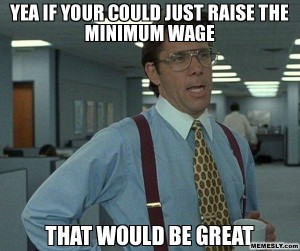Minimum wage supporters push ‘live the wage’ challenge

By Maggie Thurber | for Ohio Watchdog
LIVE THE WAGE: Supporters of a minimum wage increase think that if politicians had to live on a minimum wage for a week, they’d quickly vote for an increase. Opponents say that’s ridiculous.
Can one person survive on just $77 a week?
Former Gov. Ted Strickland and U.S. Rep. Tim Ryan are going to try.
The liberal advocacy group Americans United for Change says $77 is how much a full-time worker earning the $7.25 federal minimum wage has to spend each week after taxes and housing expenses are paid.
But they don’t think that’s enough. To prove it, the group issued a challenge — live on minimum wage for week.
But this isn’t a challenge you’re supposed to win.
You see, if legislators have to get by on a minimum wage income, even just for a week, they’ll fail and, realizing how hard it is, will eagerly vote for an increase.
At least, that’s the thinking and since Thursday marks the five-year anniversary of the last time the federal government increased the minimum wage, the timing is right.
The two Ohio Democrats, who already support increasing the minimum to $10.10 an hour, accepted.
Michael Tanner, a senior fellow at the libertarian Cato Institute, said the concept doesn’t make sense.
“What’s the point,” he asked. “We all know it’s very hard to be poor. There aren’t a lot of people who want to be poor.”
Rea Hederman, executive vice president at the free-market Buckeye Institute, called it a publicity stunt, designed to appeal to emotion.
“It’s always difficult in the minimum wage debate,” he said. “On one side you have facts and logic and on the other side you have emotional stunts.”
But Ryan, whose congressional wage is $174,000 a year — about $83 an hour — says it’s important for elected officials to understand such issues in more than an intellectual way.
“A lot of times our friends in the tea party movement or in the conservative political movement try to marginalize these men and women who work extremely hard in many jobs that those of us in Congress wouldn’t dare dream of doing,” he said during a conference call announcing the challenge.
He didn’t say how many members of Congress got paid a minimum wage in their first job.
Rep. Jan Schakowsky, D-Ill., said the goal is “to make us more sensitive to the challenges of living on a minimum wage.”
She challenged Republicans to join her.
“After they do it, I believe it will be hard for anyone to deny the importance of moving quickly to raise the minimum wage,” she said.
Does she think the only reason to oppose an increase is because you’re not sensitive enough?
Tanner, noting the lack of logic, said there are several factual problems with the ploy.
“First, minimum wage is not a lifetime event,” he explained. “It’s a starting point. More than half the people who get a minimum wage will earn a raise within a year.”
And despite claims by Schakowsky that minimum-wage workers are struggling to take care of their families, Tanner said few of them are actually heads of household, a tax filing status that means the individual is unmarried and responsible for more than half of the household expenses.
Data provided by Americans United shows only 1.4 percent of minimum wage Ohioans are single parents. Nationally, only 5 percent fit that profile, Tanner said. The rest are usually second income earners, teens, college kids or seniors who are supplementing their retirement income.
Hederman said the average income for household with a minimu- wage earner in it is $65,900, proving “they are not the breadwinners of the family.”
And they’re not poor, either. IRS data says that an adjusted gross income of $34, 823 to $70,492 puts filers in the top 50 to 25 percent of income earners.
Ryan and Schakowsky both said raising the rate is good for the economy since workers with more income will spend it, creating a ripple effect of jobs and growth.
But what if we lowered taxes instead? Wouldn’t that put more money into their pockets and result in a similar ripple effect?
For Ryan, it isn’t just the money. It’s a “major social justice issue.”
He said many politicians attend prayer breakfasts and weekly religious meetings and that Americans have a “deep respect for social justice and caring for the poor and the social gospel and all the rest.”
This is “an opportunity for us to put our money where our mouth is,” he said.
Tanner took exception to that.
“How are you taking care of the poor by killing jobs?” he asked. “Compassion is an individual virtue, not a government one. You can’t be compassionate with other peoples’ money.”
Hederman called it “un-American” to turn voluntary charity into a government mandate.
But most people support the $10.10 minimum wage hike, Schakowsky noted. And Tanner agreed that’s what many polls show.
Hederman said raising the minimum wage is one way people feel they’re helping the less fortunate.
“But it goes back to the best way to help people,” he said. “Raising the cost of labor will make it much harder for the very people you’re trying to help. There may be some winners — those who keep their jobs — but there will be losers and they’ll be far worse off. I don’t know why we want to make it harder for businesses to employ people.”
“It’s definitely the emotional appeal,” Tanner said. “But it’s an unfortunate reality that many jobs just aren’t worth that much money.”
Besides, he added, “popularity and good economics are not synonymous — and why are they stopping at $10.10? Why not $100 or $1,000 an hour?”
Tanner said since supporters readily admit a $100 an hour minimum wage would cost jobs, they’ve already conceded the principle and are now just quibbling over the numbers.







